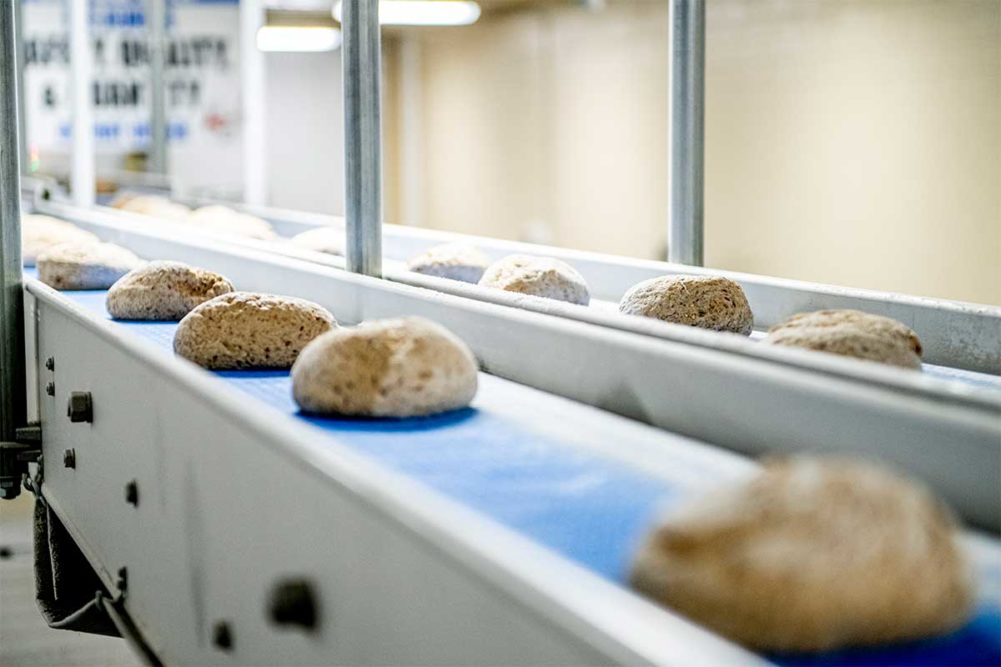As Flowers Foods, Thomasville, Ga., has grown its Dave’s Killer Bread (DKB) business, the company has looked for bakeries that can take on production to support the brand’s blossoming popularity. Geographically, the Lynchburg facility was in the perfect spot to add to the DKB capacity from Tuscaloosa, Ala., and support consumer demand in the Northeast and mid-Atlantic regions. On top of that, the bakery had a stable, high-quality workforce already in place, which has only become more critical in today’s labor market.
“We could have gone to a bigger city and built a new bakery, but the biggest hurdle with that plan is you have to start with a workforce that doesn’t know the bakery business,” explained Robert Benton, executive vice president, network optimization, Flowers Foods. “We had a good management team already here, and we only had to relocate a few people.”
During the renovation, the workforce was furloughed, and all but one returned to work when the bakery opened, speaking to the loyalty Lynchburg’s team has for its bakery.
“The team you see today is mostly the same team that started up the bakery,” said, Rich Luciano, general manager, Lynchburg Organic Baking Co.
Flowers acquired the building in 1978 from Kerns and expanded and renovated it in 1981 to increase the administrative offices and add a shipping area. The bakery was producing Sunbeam bread and housed a small Nature’s Own bun line. The Sunbeam process is a continuous mix line and converting to the DKB process required a total renovation as well as retraining the staff on the new process.
Robert Ray, vice president, network optimization, was the project manager who oversaw the complete dismantling and modernization process of the more-than-a-century old facility.
“Due to its age, this was an incredibly complicated project,” Mr. Benton commented. “Working with an accelerated timeline, Robert did an outstanding job converting an aging facility into a high-performing modern bakery.”
In addition to installing new equipment to produce DKB, Mr. Ray coordinated all of the day-to-day activities of the renovation, overseeing construction, vendor relations, permitting and regulatory, electrical, mechanical and plumbing. This allowed Flowers to invest holistically from the ground up to make the new Lynchburg Organic Baking Co. an extremely sustainable operation.
First things first, more than 400 energy efficient LED lights were installed, which not only improved the lighting but also lowered the temperature in the bakery, making a more comfortable work environment.
The most significant improvements, however, were the high-efficiency ovens, the heat recovery systems and the new refrigeration system. The ovens required Flowers to install an oxidizer to meet air permit regulations. The company made the added investment to incorporate a glycol loop that recovers the waste heat and uses it to create the steam in the proofer. This system eliminated the need for a boiler.
“It’s hard to go into a facility and retrofit that kind of technology — the ROI just isn’t there like it is with these new lines,” said Margaret Ann Marsh, vice president, sustainability and environmental, Flowers Foods. “It just made sense to add it as part of the project because it would be a big hurdle to do it on its own.”
The heat recovery system also heats water for the plant and the water jackets for some of the ingredient tanks.
The AMF Bakery Systems oven itself is also more efficient, offering the operators control over the burners in each zone, making sure it’s running as efficiently as possible.
“Comparing older models and this oven, there are a great many advances, from something as simple as insulation to the complex internal convection system that recirculates the heat,” Mr. Luciano explained. “Our gas usage is lower because of it.”
Air compressors were another opportunity for energy savings. After an air audit, Flowers replaced the 300 hp fixed speed air compressor with a high-efficiency 150 hp variable frequency drive air compressor, which Mr. Luciano said only has to run at 40% capacity on average. The comprehensive audit helped the bakery understand exactly the size of air compressor it needed.
“The audit evaluates piping size and design and whether or not the bakery has any leaks because if you do, you might think you need a bigger air compressor when you actually don’t,” Ms. Marsh explained. “The audit allows us to look at air from a bigger perspective.”
The bakery also incorporated blowers to clean pans rather than compressed air and a more efficient refrigeration system with air-cooled chillers. The air-cooled water chiller eliminated the need for extra water for cooling while also avoiding any potential leaks, according to Ms. Marsh.
All of these improvements collectively resulted in the Lynchburg Organic Baking Co. winning the EPA’s Better Project Award.
“Lynchburg was designed with energy efficiency or sustainability integrated throughout its entire design; that’s what made it unique,” Ms. Marsh explained. “Lynchburg proved that these technologies produced significant savings and that there is potential for even more impact by continuing to incorporate measures across the Flowers bakery network when planning new lines and upgrades.”
This article is an excerpt from the August 2022 issue of Baking & Snack. To read the entire feature on Flowers Foods/DKB, click here.





